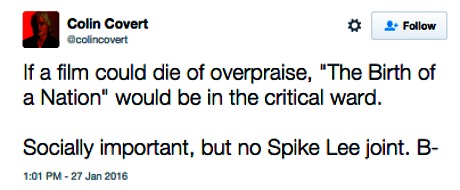The reign of terror in post-revolutionary France happened over a ten-month period (September 1793 to July 1794), and was marked by mass executions of “enemies of the revolution.” I don’t want to go out on a crazy limb but a distant cousin of this mentality is alive and well in Park City right now, and thriving among the general community of p.c. goose-steppers who are excited/delighted by the love shown for Nate Parker‘s The Birth of a Nation. Over the last 12 hours or so it’s been hinted a few times that my being a Birth disser (at least as far as the over-praise is concerned) isn’t good for my social, political or financial health, and that I should think about getting with the program.

The elite Sundance festivalgoer support of this film is an expression of liberal enlightenment as well as a pushback against the OscarsSoWhite mentality that has caused to much recent consternation. I’m mentioning the “terror” analogy because, as noted, I’ve heard from a few descendants of Maximilien Robespierres over the last 16 hours, or since I posted my negative review of Parker’s film. These people have hinted that my critique is possibly racist in origin (“What’s your real agenda, Jeff?”), and that I’m saying the wrong thing at the wrong time, and that there must be something wrong with me not to want to join in celebrating this wonderful, Oscar-bound film, and do I want to risk missing out on a Phase One campaign buy from Fox Searchlight?
Steven Gaydos: “Of all the movies Jeff Wells has seen at festivals, all the politically correct tomes targeted to the ‘hipsters’ in attendance, all the overreactions to so-so pics and all of the rapturous sonnets to cinema that are far too generous to what’s on the screen, somehow THIS film made by an African-American about the African-American experience is the epic affront to his sensibilities, the bridge too far, and ‘one of the biggest self-congratulatory circle jerks and politically correct wank-offs in the history of the Sundance Film Festival.” Phew! That’s a tough honor to achieve. So glad the militia crowd is supporting your tough ‘stance’ on this clickbait Alamo.”
Sasha Stone: “When people say ‘thank you for fighting against the tide’ I wonder what they really mean by that.” Me: “Will you STOP with your bullshit racial-attitude baiting? You’re no different than the glee club that rose to its feet last night at the Eccles and went mad with delight.”
Read more



